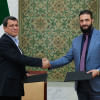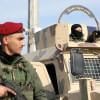The Education Antidote to Radicalisation

No visitor to the Middle East can avoid noticing the yawning gap between the educational, entrepreneurial, and occupational aspirations of the region's young people and the harsh reality that deprives so many of them of a positive future. Indeed, in the Middle East, half of those aged 18-25 are either unemployed or underemployed.
Aggravating this situation is the global refugee crisis, which has displaced some 30 million children, six million from Syria alone, very few of whom are likely to return home during their school-age years. It should come as no surprise that the group known in the region as Daesh (the Islamic State) believes that it can find fertile ground for recruitment in this vast population of dispossessed and disaffected young people.
Daesh propagandists are misusing social media in the way that their extremist predecessors and contemporaries have sometimes misused mosques – as a forum for radicalisation. The group consistently posts content that challenges the possibility of coexistence between Islam and the West and calls young people to jihad.
The grotesquely violent videos that Daesh produces have shock appeal. But what really attracts disaffected young people is the invitation to be part of something that seems larger than themselves and the societies in which they live. Shiraz Maher of the International Center for the Study of Radicalisation (ICSR) at King's College London identifies a common thread of sentiment among recruits: "righteous indignation, defiance, a sense of persecution, and a refusal to conform." As a recent Quilliam Foundation report concludes, Daesh plays on the youthful desire to be part of something worthwhile; it is the organisation's utopian appeal that is most alluring to new recruits.
Given this, few would disagree that we find ourselves in a generational battle for hearts and minds that cannot be won by military means alone. Hard power can eliminate Daesh's hardcore leaders. But we will need more than that to convince nearly 200 million young Muslims that extremism is, quite literally, a dead end.
There are many examples of under-the-radar operations working to counter extremism across the Indian subcontinent and the Middle East: children's magazines in Pakistan, videos aimed at teenagers in North Africa, radio stations in the Middle East, and books and publications opposing Al Qaeda. They can help to expose the truth about life in Daesh – that it is brutal, corrupt, and prone to internal purges – in several ways, including by drawing attention to defections. As a 2014 report states, "[the very existence of defectors] shatters the image of unity and determination that [the group] seeks to convey."
But we must be more ambitious if we are to win the war of ideas, sustaining the cultural space that Daesh calls the "the grey zone," which it longs to destroy. It is a space in which Muslims and non-Muslims can coexist, discover their shared values, and cooperate. Peter Neumann, the director of the ICSR, has proposed a YouTube contest for videos that explain the failings of Daesh. "You would receive 5,000 videos in no time," he says. "Four thousand are junk, but 1,000 of them are effective – 1,000 videos against [Daesh] propaganda."
The best long-term tool for countering extremism, however, is education. In Jaffa, Israel, a school run by the Church of Scotland teaches the virtues of tolerance to Muslim, Jewish, and Christian children. Throughout Lebanon, a common school curriculum championing religious diversity – including the "refusal of any radicalism and religious or sectarian seclusion" – is being taught to Sunni, Shia, and Christian children starting at the age of nine. The country has also introduced double shifts in its school system to accommodate some 200,000 Syrian refugee children.
If troubled Lebanon, wracked by sectarian violence and religious divides, can champion coexistence and provide Syrian refugees with a chance to study, there is no reason other countries in the region should not follow its example.
The choice could not be clearer. We can stand by and watch a new generation of web-savvy Muslim youth be deluged with false claims that Islam cannot coexist with Western values. Or we can recognise that the young people of the Middle East and the rest of the Muslim world share the aspirations of young people in every other part of the world.
All the evidence indicates that the region's young people want education, employment, and the chance to make the most of their talents. Our resolution for 2016 should be to make that happen.
The writer, former Prime Minister and Chancellor of the Exchequer of the United Kingdom, is the United Nations Special Envoy for Global Education.
Copyright: Project Syndicate, 2015.
www.project-syndicate.org
(Exclusive to The Daily Star)

 For all latest news, follow The Daily Star's Google News channel.
For all latest news, follow The Daily Star's Google News channel. 








Comments